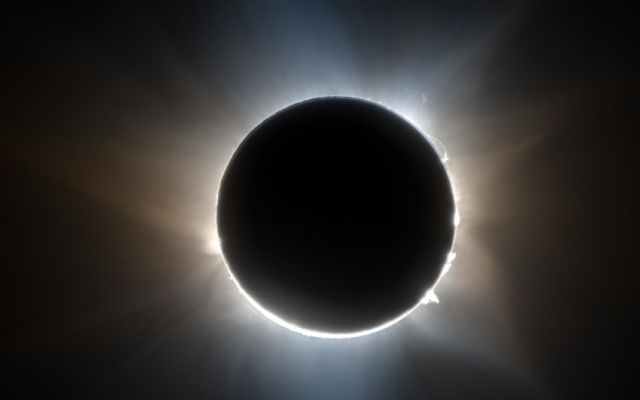
3 ways to ensure your solar eclipse glasses are safe
If you’re lucky enough to witness Maine’s first total solar eclipse since the 1960s on April 8, you’ll need special glasses to protect your eyes from the sun. Whether you’ve had glasses for months or just got a pair, now is a good time to make sure they’re safe.
The American Astronomical Society warned last week that fake and counterfeit solar eclipse glasses have polluted the market. With the celestial event just over a week away, “it is critical that everyone understand how to spot unsafe products,” according to the organization. Without proper protection, you could seriously damage your eyes.
A library in Dexter recently discovered it had distributed eclipse glasses that appeared to be faulty after a patron said they could see through the lenses in ordinary daylight. Abbott Memorial Library Director Liz Breault said the library threw out the last 10 or so pairs in the batch of 25 and would post a warning on its Facebook page. The other batch of glasses it received was fine, she said.
It had gotten the glasses from the Maine State Library, which has distributed more than 4,500 pairs to libraries around the state, said Christina Dorman, the agency’s STEM librarian. The state library received them all from a Space Science Institute program for libraries and a trusted manufacturer, she said.
Dorman said there’s no reason to suspect that the glasses distributed by libraries around the state are faulty, as they adhere to international safety standards and are from sources approved by the American Astronomical Society.
To ensure your glasses are safe to view the eclipse, here are three easy steps you can take before April 8.
1. Test your glasses at home. Put them on inside and look at a light like a shaded lamp. Do not test them for the first time by looking at the sun.
“If you can see that light, your eclipse glasses aren’t strong enough,” according to the Planetary Society. “If you try this and can’t see the light, try looking at something brighter like a bare lightbulb. This should appear dim through a safe solar lens.”
Once you determine that it’s safe to glance at the sun, take note if what you see through your glasses is uncomfortably bright, blurry or surrounded by a bright haze, the organization advised. Those are signs that your glasses aren’t safe.
2. Look for this label on your glasses: ISO 12312-2. It means they have met international safety standards for viewing the eclipse.
Eclipse glasses manufacturers send their products to specialized labs that test whether the lenses comply with ISO 12312-2 specifications, according to the Planetary Society. The nonprofit warns that some vendors sell glasses with the ISO label that have not been tested.
The American Astronomical Society has a list of reputable manufacturers.
3. Check your glasses to make sure they’re in good condition. If you notice any punctures, scratches or tears on the lenses, throw them away. Be sure to get a new pair before April 8 so you aren’t scrambling at the last minute.